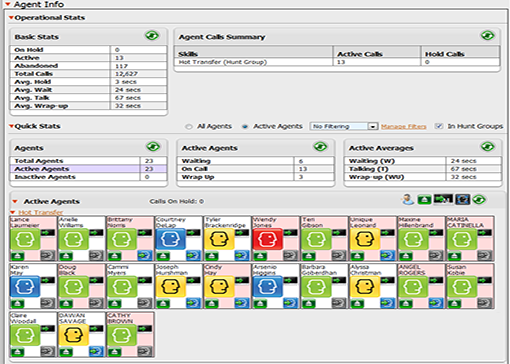TCN Shares How Enterprises Can Improve Business Outcomes with CRM Contact Center Software Integration

Understanding and engaging customers these days require more than just resolving a one-time problem or responding to their feedback. To truly connect with customers and stay competitive, contact centers need to provide real-time, personalized customer interactions. And one of the keys to achieving this is by integrating a robust Customer Relationship Management (CRM) solution with a contact center platform.
In this article, Mckay Bird, Chief Marketing Officer at TCN, Inc. offers insights about the importance of CRM software integration in the contact center and shares how Platform 3.0, TCN’s award-winning cloud-based contact center suite, can help contact centers improve business outcomes.
Top Challenges Faced by the Modern Contact Center
Far from being the cost centers that they were once perceived to be, contact centers have dramatically evolved over the past years due to the widespread adoption of digital technologies and devices. They have now become more of a customer experience and engagement hub, where the battle to win and retain customers is fought daily. Yet despite its growing importance, contact centers continue to face several challenges that hinder them from delivering superior customer service.

According to Bird: “In today’s digital world, contact centers are challenged with high agent turnover, timely reporting standards, finding affordable, customizable IVR solutions, as well as, implementing new omnichannel features into existing contact center platforms.” These thoughts are confirmed by a 2016 survey by the Contact Center Pipeline, an instructional journal focused on the specific needs and challenges of the contact center.
According to the survey, today’s contact centers face a number of diverse challenges, primarily attrition (24.19%), lack of/poor cross-departmental collaboration (19.13%), insufficient self-service (18.41%), inability to achieve service level or ASA (18.41%), and lack of and/or bad desktop tools (CRM, KM, CIS, billing, etc) (16.61%). Attrition is an age-old problem within the contact center space and is most frequently noted for larger contact centers (with 500 and more employees) but ranks lower for those under 25 and 51-100 seats. Desktop tool issues, meanwhile, were noted at every contact center size.
The report also revealed the top priorities of survey respondents. These include improvement of performance management/coaching (31.41%), improvement of training (28.88%), improvement of reporting and analytics (23.47%), and automation of processes (23.10%).
For companies that seek to remain competitive, it is crucial to acknowledge and address these problems and align their priorities accordingly in order to improve customer satisfaction, employee productivity and morale, and overall business operations. Fortunately, several strategies exist to create a contact center that powers healthy customer and employee relationships. Among these are integrating CRM technology into existing contact center software.
Combining CRM and Contact Center Technologies to Improve the Customer Experience
“How many times have you been on a call and have been asked your basic information 3-4 times from 3-4 different agents?,” asks Bird. “In order for businesses to better know and identify their customers, they should invest in some form of Custom Relationship Management (CRM) software,” advises Bird. CRM or Customer Relationship Management software serves as the central nervous system for sales, marketing, and customer service teams. In a contact center, a CRM solution is highly valuable as it provides teams the ability to manage customer data and puts key account information at the fingertips of agents.
“CRM software compiles deep customer profiles, providing agents with instant access to a customer’s call history, including extensive notes on previous interactions and conversations had with the company. Every customer-facing business should consider implementing CRM technology to reduce time, money and frustration, further improving the overall customer experience,” said Bird. “When CRM software is integrated with advanced contact center solutions, companies are able to streamline the customer experience, saving both time and money with more accurate and efficient reporting.” Some of the most popular CRM software today include Salesforce, Hubspot, and Zoho CRM.
Customers are not the only ones who benefit from merging CRM and contact center software, though. Contact center agents also benefit from the integration as they are able to provide better service to customers with less difficulty and frustration, which often results in increased productivity and morale. And as every manager knows, happy employees create happy customers.
Taking Customer Service to the Next Level with Platform 3.0
 TCN, a trusted provider of robust cloud communications technology and solutions for the contact center industry, understands the importance of CRM in the contact center. That is why Platform 3.0, TCN’s award-winning cloud-based contact center suite, was designed to be able to seamlessly integrate with leading CRM tools, as well as collections software and other tools, to simplify account updating and streamline operations. “Platform 3.0 is intuitive, customizable, and fully equipped to deliver more efficient dialing than ever before. With hundreds of API integration points, Platform 3.0 is guaranteed to enhance any type of call center or BPO,” stated Bird.
TCN, a trusted provider of robust cloud communications technology and solutions for the contact center industry, understands the importance of CRM in the contact center. That is why Platform 3.0, TCN’s award-winning cloud-based contact center suite, was designed to be able to seamlessly integrate with leading CRM tools, as well as collections software and other tools, to simplify account updating and streamline operations. “Platform 3.0 is intuitive, customizable, and fully equipped to deliver more efficient dialing than ever before. With hundreds of API integration points, Platform 3.0 is guaranteed to enhance any type of call center or BPO,” stated Bird.
Platform 3.0 includes a comprehensive array of advanced cloud-based Inbound, Outbound, and Blended solutions. TCN also recently enhanced its contact center platform with new capabilities such as VocalDirect, a direct-to-voicemail feature, and AgentSMS, a texting feature--both of which are designed to help teams deliver a richer experience for customers. But for teams that seek to surpass their competition, facilitate better interactions with customers, and further streamline operations, one feature that cannot be overlooked is Platform 3.0’s Business Intelligence (BI) technology. This feature allows businesses to measure, compare, prescribe and predict call center performance by providing access to click-configurable business insights, metrics, and charts.
According to Bird, “To make the most out of TCN’s Platform 3.0 capabilities, contact centers should connect the platform with business intelligence technology. With TCN’s Business Intelligence Suite, contact centers have access to streamlined data and customized reporting, enabling contact centers to identify business performance improvement, discover seasonal trends and patterns, manage time more efficiently and make better-informed decisions.”
Rising Trends in the Contact Center Space
Bird believes that the future holds amazing advances that will transform the role of contact centers. Automation and Artificial Intelligence (AI), in particular, are top trends that Bird believes will significantly shape the contact center space. He also believes that an increase in the deployment of integrated omnichannel solutions will also further transform contact center operations today. “As a response to these developments, TCN most recently announced two new omnichannel features to their comprehensive cloud-based contact center platform,” said Bird. “These omnichannel features include a new direct-to-voicemail technology known as VocalDirect and a new SMS texting feature called AgentSMS.” Bird says more TCN omnichannel features will be announced at a later date this year.
To learn more about TCN and how they are are transforming contact centers worldwide, visit TCN’s website.
About TCN
TCN delivers cutting-edge communications technology and solutions for the contact center industry. Established in 1999, TCN offers advanced and streamlined solutions to customers seeking a hosted contact center built on new-age technology. Their flagship product, Platform 3.0, offers Inbound, Outbound, and True Blended options for customers who are seeking a hosted contact center suite that can meet their individual business needs. Their solutions also include IVR, call distribution, and call recording storage, in addition to applications like BPO, events notification, surveys, and others.




